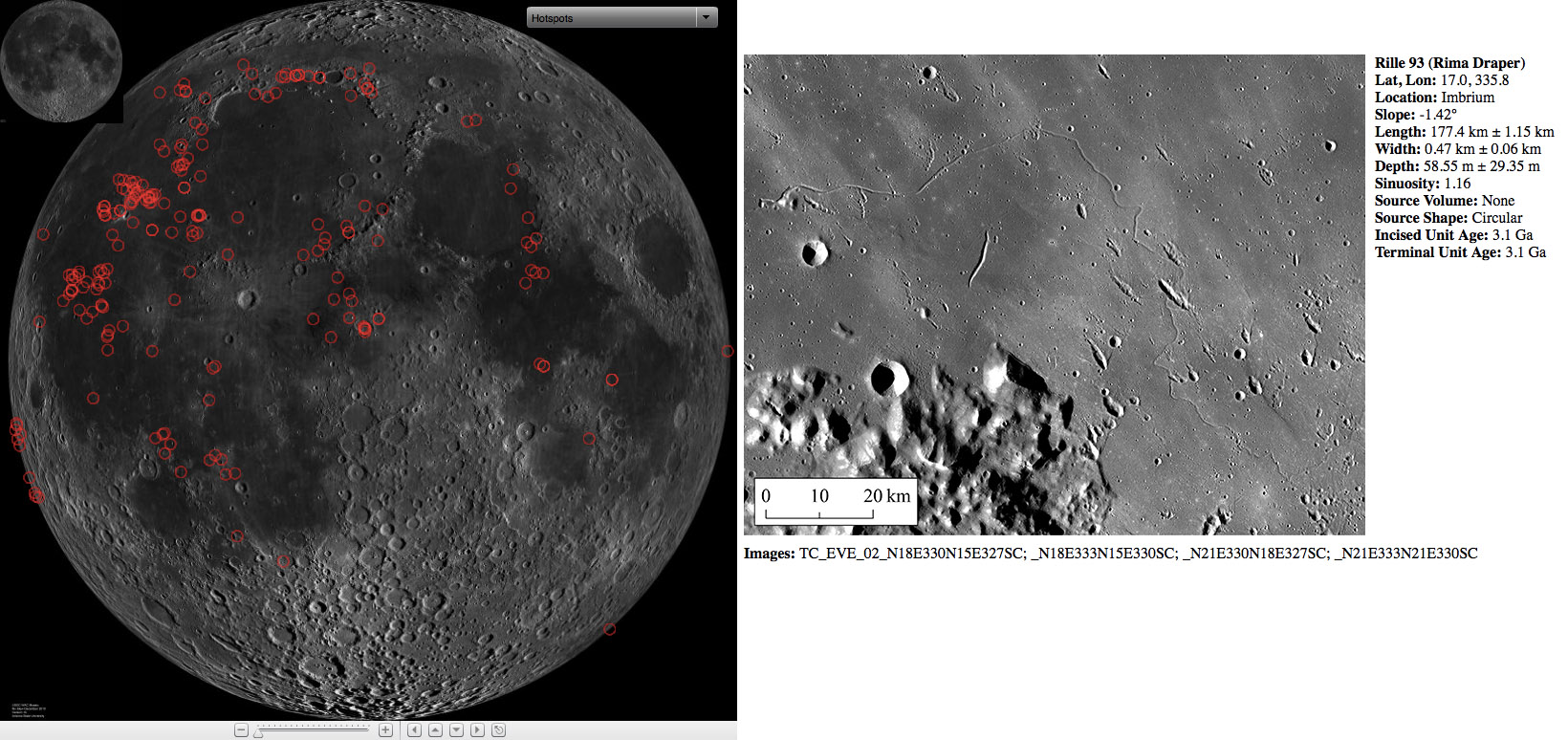Difference between revisions of "July 18, 2014"
| Line 1: | Line 1: | ||
__NOTOC__ | __NOTOC__ | ||
=All the Rilles= | =All the Rilles= | ||
| − | |||
<!-- ws:start:WikiTextHeadingRule:0:<h1> --> | <!-- ws:start:WikiTextHeadingRule:0:<h1> --> | ||
<!-- ws:start:WikiTextLocalImageRule:6:<img src="/file/view/LPOD-Jul18-14.jpg/516501812/LPOD-Jul18-14.jpg" alt="" title="" /> -->[[File:LPOD-Jul18-14.jpg|LPOD-Jul18-14.jpg]]<!-- ws:end:WikiTextLocalImageRule:6 --><br /> | <!-- ws:start:WikiTextLocalImageRule:6:<img src="/file/view/LPOD-Jul18-14.jpg/516501812/LPOD-Jul18-14.jpg" alt="" title="" /> -->[[File:LPOD-Jul18-14.jpg|LPOD-Jul18-14.jpg]]<!-- ws:end:WikiTextLocalImageRule:6 --><br /> | ||
| − | <em>images from [http://www.lpi.usra.edu/lunar/rilles/ Atlas of Lunar Sinuous Rilles]</em><br /> | + | <em>images from [http://www.lpi.usra.edu/lunar/rilles/" rel="nofollow Atlas of Lunar Sinuous Rilles]</em><br /> |
<br /> | <br /> | ||
The Lunar and Planetary Institute has just announced the on-line publication of the <em>Atlas of Lunar Sinuous Rilles.</em> The Google Maps-like interface (left) allows zooming into an area of interest, and clicking a red circle brings up an LRO image and summary of physical characteristic of each rille. In addition to expected information on the position, length, width and depth, each rille is also characterized by its sinuosity (wigglyness), volume and shape of source vent, and the age of the lavas at the source and terminal ends (from the [http://lpod.wikispaces.com/May+4%2C+2010 age mapping] by Harry Heisinger). This collection of rille information may seem familiar for it comes from Debra Hurwitz' doctoral dissertation and resultant [http://lpod.wikispaces.com/May+5%2C+2013 publication]. Debra has now moved to LPI, hence their publication. This atlas joins the [http://lpod.wikispaces.com/July+11%2C+2014 GLR Lunar Domes Atlas] as a modern resource quantitatively documenting lunar features. A little sad, though. As all lunar features are catalogued there will be less chance for a happy discovery of something never before noticed. But I'll keep looking, for its all new to me if I haven't seen it before.<br /> | The Lunar and Planetary Institute has just announced the on-line publication of the <em>Atlas of Lunar Sinuous Rilles.</em> The Google Maps-like interface (left) allows zooming into an area of interest, and clicking a red circle brings up an LRO image and summary of physical characteristic of each rille. In addition to expected information on the position, length, width and depth, each rille is also characterized by its sinuosity (wigglyness), volume and shape of source vent, and the age of the lavas at the source and terminal ends (from the [http://lpod.wikispaces.com/May+4%2C+2010 age mapping] by Harry Heisinger). This collection of rille information may seem familiar for it comes from Debra Hurwitz' doctoral dissertation and resultant [http://lpod.wikispaces.com/May+5%2C+2013 publication]. Debra has now moved to LPI, hence their publication. This atlas joins the [http://lpod.wikispaces.com/July+11%2C+2014 GLR Lunar Domes Atlas] as a modern resource quantitatively documenting lunar features. A little sad, though. As all lunar features are catalogued there will be less chance for a happy discovery of something never before noticed. But I'll keep looking, for its all new to me if I haven't seen it before.<br /> | ||
<br /> | <br /> | ||
| − | <em>[mailto:tychocrater@yahoo.com Chuck Wood]</em><br /> | + | <em>[mailto:tychocrater@yahoo.com" rel="nofollow Chuck Wood]</em><br /> |
<br /> | <br /> | ||
<strong>Technical Details</strong><br /> | <strong>Technical Details</strong><br /> | ||
| − | The atlas is based on the work of D. M. Hurwitz, J. W. Head, and H. Hiesinger (2013) [http://www.deepdyve.com/lp/elsevier/lunar-sinuous-rilles-distribution-characteristics-and-implications-for-goVSB04O0v Lunar sinuous rilles: Distribution, characteristics, and implications for their origin], <em>Planetary and Space Science, 79-80,</em> p. 1-38.<br /> | + | The atlas is based on the work of D. M. Hurwitz, J. W. Head, and H. Hiesinger (2013) [http://www.deepdyve.com/lp/elsevier/lunar-sinuous-rilles-distribution-characteristics-and-implications-for-goVSB04O0v" rel="nofollow Lunar sinuous rilles: Distribution, characteristics, and implications for their origin], <em>Planetary and Space Science, 79-80,</em> p. 1-38.<br /> |
<br /> | <br /> | ||
<hr /> | <hr /> | ||
Revision as of 22:02, 4 January 2015
All the Rilles

images from " rel="nofollow Atlas of Lunar Sinuous Rilles
The Lunar and Planetary Institute has just announced the on-line publication of the Atlas of Lunar Sinuous Rilles. The Google Maps-like interface (left) allows zooming into an area of interest, and clicking a red circle brings up an LRO image and summary of physical characteristic of each rille. In addition to expected information on the position, length, width and depth, each rille is also characterized by its sinuosity (wigglyness), volume and shape of source vent, and the age of the lavas at the source and terminal ends (from the age mapping by Harry Heisinger). This collection of rille information may seem familiar for it comes from Debra Hurwitz' doctoral dissertation and resultant publication. Debra has now moved to LPI, hence their publication. This atlas joins the GLR Lunar Domes Atlas as a modern resource quantitatively documenting lunar features. A little sad, though. As all lunar features are catalogued there will be less chance for a happy discovery of something never before noticed. But I'll keep looking, for its all new to me if I haven't seen it before.
" rel="nofollow Chuck Wood
Technical Details
The atlas is based on the work of D. M. Hurwitz, J. W. Head, and H. Hiesinger (2013) " rel="nofollow Lunar sinuous rilles: Distribution, characteristics, and implications for their origin, Planetary and Space Science, 79-80, p. 1-38.



